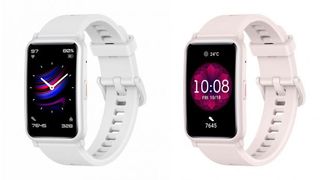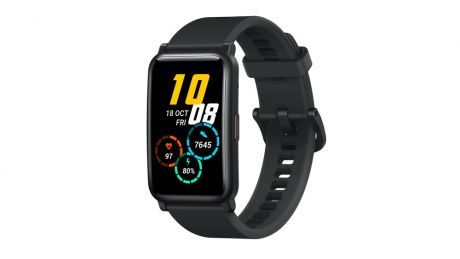You can trust Coach
The Honor Watch ES seems to offer exceptional value for money. It costs £99.99, has a glossy 1.64in AMOLED touchscreen, tracks 95 different sports and can guide you through 12 workouts with animations on screen.
It claims a battery life of ten days and I’m a fan of the design, with its stretched screen that makes the ES a cross between a smartwatch and a fitness tracker. And it is a pretty smart device, with notifications, weather reports, plus the ability to store and play music (although only for users of Android smartphones).
Along with 24/7 heart rate tracking the ES will monitor your stress (again, Android only), and offers the excellent TruSleep sleep tracking that Huawei devices do (Huawei is Honor’s parent company).
Unfortunately, I’ve not found that the Honor Watch ES lives up to its promise. That’s partly because there are still some important features missing, such as built-in GPS and the ability to sync your activities to third-party apps like Strava. But mostly because I’ve found the accuracy of the device to be poor.
That worst offender is the heart rate monitor, which is inaccurate at all times. Most devices can be expected to be in the right ballpark when you’re not exercising, but even there the Watch ES consistently returned a reading 20-30 beats too high. During exercise it was even worse, regularly spiking for no reason and also being consistently too high, compared with a chest strap linked to another watch. You also cannot connect the watch to an external chest strap for more accuracy.
Distance tracking on outdoor activities also proved hit and miss, mainly because the ES relies on phone GPS but often failed to connect to my phone at the start of a run or cycle, even if I waited up to ten minutes to give it a chance to connect. On the runs I’ve done with it, it failed to connect about half the time although the app said the watch was connected, which meant it tracked distance based on the accelerometer and being miles off the actual distance I ran.
When the device did connect to my phone before I started, the distance tracking was pretty good. You can also choose which stats show during a run to show your preferred data, although it lacks useful metrics like lap pace, and with no always-on screen available for sports tracking you have to turn your wrist and wait a moment for the screen to wake before seeing how you’re doing.
As for the ten-day battery life, that is cut down significantly if you opt for an always-on display for the main watch face, and with regular sports tracking I found that the watch only got through four to five days before needing charging.
See related

There is a nice range of watch faces available for the ES. Some are more power-intensive than others; you can opt to have an always-on watch face available but, as mentioned, it will severely affect your battery life. The raise-to-wake display was responsive enough that I actually turned off the always-on option in the end, rating the battery life as more important.
Everyday activity is tracked with three rings to fill in each day: steps, active minutes and hours active. You can change your step target in the partner Huawei Health app. The watch can also measure your blood oxygen saturation and the app links to a quick explanation of what your score means, which is useful.
On previous Huawei devices I’ve tested, I’ve rated the sleep tracking very highly for both accuracy and the depth of detail provided. Unfortunately, while the ES shows a lot of detail in terms of things like time in different types of sleep, breathing quality and sleep continuity – with links in the app to give more info on each measurement – the accuracy was off once again.
I was wearing the watch during a particularly fraught few days when my one-year-old daughter was doing her level best to keep me awake all night, but the Watch ES recorded unbroken good-quality sleep. It even failed to register a four-hour period where I was awake and moving about the house, recording it as time asleep instead.
I did like the guided workouts on the watch though. There are 12 of them and they offer a range of sessions, such as a three-minute neck and shoulder relaxation and a 15-minute abs workout.
The workouts are pretty simple, but they will be useful for beginners, especially since the on-screen animations show you how to complete the exercises. You can see what the workout involves before starting by hitting the info button, where you’ll also find a difficulty rating. I’d say that even the high difficulty options will be achievable for most people – none of the workouts last longer than 18 minutes and all of them stick to bodyweight moves.
The Honor Watch ES isn’t a terrible device by any means, but I found there were too many accuracy problems to recommend it, especially as there is decent competition from other brands around the £100 mark. Fitbit’s Inspire 2 (£89.99) might lack a few features compared with the Watch ES, including music and the large screen, but Fitbit devices have always been accurate when it comes to heart rate and sleep tracking. And if you can stretch to £129.99 for the Fitbit Charge 4 you’ll be getting a tracker band with built-in GPS for accurate outdoor activity tracking.
There is also the Huawei Watch Fit to consider, which has a similar design to the Honor Watch ES but offers more features, including built-in GPS and training analysis in partnership with Firstbeat (a third-party supplier which Garmin employs to great effect) that includes things like suggested recovery time. Other Huawei devices I’ve tested have also been far more accurate on sleep and heart rate tracking.
The Huawei Watch Fit is £119.99 and seems the clear choice if you are buying into the Honor/Huawei ecosystem, which I’d only recommend doing if you are on Android, since you get features like music and stress tracking which you don’t if you use an iPhone.
Buy from Honor | £99.99

Nick Harris-Fry is a journalist who has been covering health and fitness since 2015. Nick is an avid runner, covering 70-110km a week, which gives him ample opportunity to test a wide range of running shoes and running gear. He is also the chief tester for fitness trackers and running watches, treadmills and exercise bikes, and workout headphones.

Coros Vertix 2S Review: The Garmin Fenix Rival Gets Some Useful Upgrades

I Tried CrossFit Champ Mat Fraser’s Signature 40-Minute EMOM And It Helped Me Build Strength, Skill And Endurance In One Fell Swoop

I Took A Test To Find Out If I Had What It Takes To Be An Elite Athlete And It’s Changed My Training For The Better
